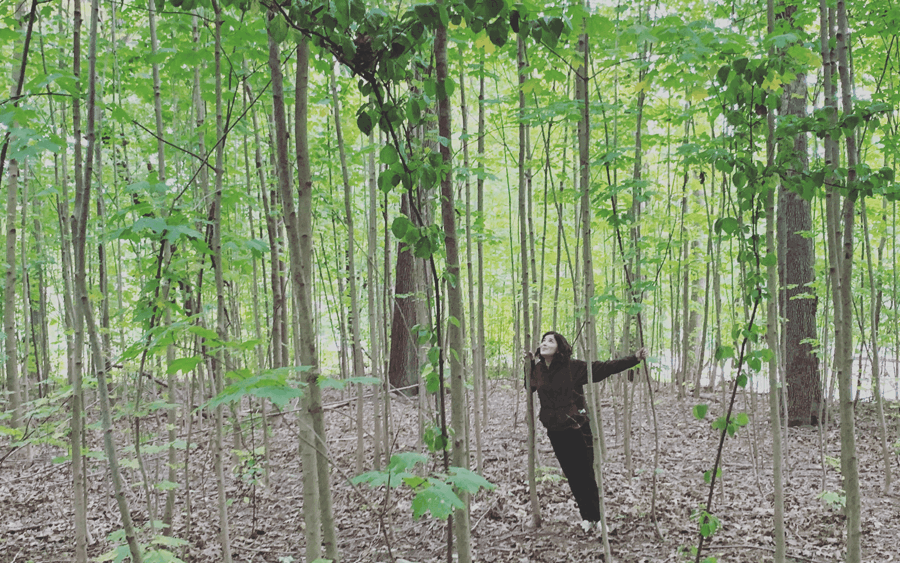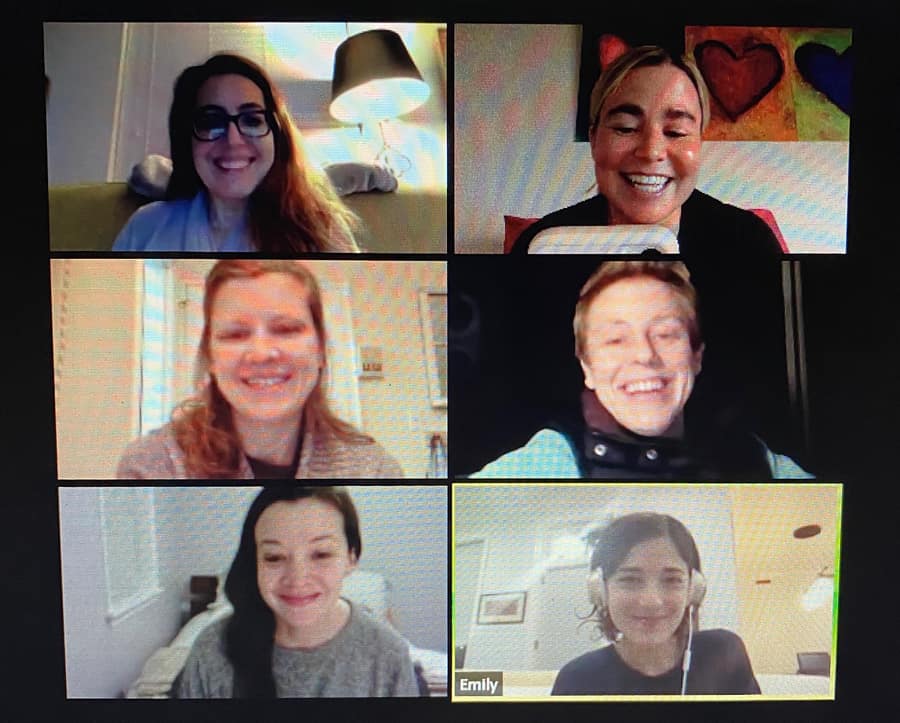שמירה על בטיחות ושמירה על שפיות: עצות מווטרינר לבקרת זיהומים במהלך התפרצות נגיף הקורונה
On today’s blog, Emily’s Entourage Co-Founder, Emily Kramer-Golinkoff, draws on her lifetime of experience taking preventive measures to avoid germs as a result of Cystic Fibrosis. She shares her top recommendations for effectively preventing transmission of dangerous germs while also preserving one’s emotional health.
With the coronavirus pandemic unfolding before our eyes, it is hard not to feel overcome with panic, fear, and helplessness. These are scary and surreal times for the whole world, and that fear is only heightened for vulnerable populations who are particularly at risk for bad outcomes from this novel coronavirus (COVID-19).
While nothing we have ever faced as a world in our lifetime compares to this, I cannot help but be struck by some of the parallels between life with Cystic Fibrosis (CF) and COVID-19.
Currently, the world is living with heightened germ awareness and taking infection control precautions that the CF community lives with and follows every day as a result of our chronic, fatal genetic disease. People are avoiding handshakes and crowds, maintaining a 6 foot distance from other people, and feeling fearful at the mere sound of a sniffle or cough. Sounds eerily familiar to everyday life with CF. After all, a simple cold or worse, the flu, has always been potentially catastrophic for the CF community.
Let me be clear, I am not here to complain or conjure empathy. Quite the contrary. I am here because a lifetime with CF has given me a repertoire of tools and tricks for staying safe from germs, but also staying sane during social distancing that I think might be helpful for you too. Who would have thought CF would pay off in this way?
“I am here because a lifetime with CF has given me a repertoire of tools and tricks for staying safe from germs, but also staying sane during social distancing that I think might be helpful for you too. “
But first, a few important disclaimers:
- I am neither a doctor nor a public health official. These are just the precautions I have chosen to follow. If you have a health condition, check with your medical team to come up with the best plan for your circumstance.
- People with CF represent an especially at risk population, so the precautions I am following are admittedly extreme and not necessarily generalizable to a healthy population. The stakes are high for me, and I am choosing to go to great lengths to minimize my risk. These are my personal choices.
- I recognize the enormous privilege I have in being able to self quarantine, have access to food and medications, and continue so many parts of my daily life virtually. I realize that is a privilege not shared by many.
And so, without further adieu, here is my plan for staying safe and sane during these crazy, scary coronavirus times:
STAY SAFE
1. Self isolate. I am voluntarily self quarantining. My family is too. For us, that means not leaving the house aside from going outside for walks. I am minimizing my exposure to people who are not self quarantining as much as possible.
2. Wash your hands, rigorously (20 seconds or more) and often. When I do not have access to soap and water, I am using hand sanitizer, also liberally and often.
3. Do not touch your face. This one is hard for me!
4. Create a ‘staging’ station for clean entry into your house. We created a staging station at the front door equipped with hand sanitizer and alcohol swabs. We are having everyone sanitize their hands and phones when they enter and take their coats and shoes off. We are also sanitizing all packages that are delivered.
5. Clean your phones. I am sanitizing my phone multiple times throughout the day with 70% isopropyl alcohol. Phones are a germ cesspool but they are also very easy to disinfect.
6. Clean commonly touched surfaces. We are regularly cleaning door handles, sink faucets and handles, and other surfaces and areas that get touched often and by many (i.e. light switches).
7. Change all non-urgent appointments. For all non-urgent doctors appointments, I either canceled them or switched them to virtual appointments, when possible.
8. Stock up on essentials (without hoarding). In preparation for a prolonged stay at home, I stocked up on food and checked all my medication and medical supplies to make sure I had enough for a few weeks. Just to be clear, I am not hoarding nor am I advocating hoarding. I am merely ensuring I have the essentials I need during a quarantine.
STAY SANE
1. Stay busy… virtually. Thank goodness for digital technology that enables virtual collaboration, discussions and meetings, and work. It is easy to get swept up in the panic of the news cycle. Staying busy keeps me focused, productive, and in a better head space.
2. Get physical activity. Anyone who knows me knows I am very attached to my fitbit and religious about my 10K daily steps goal. Despite the quarantine, I am not wavering in my fitness goals! The outdoors is coronavirus-free (for the most part)! I am taking multiple long walks a day to get exercise and work my lungs, and also to clear my head. Moving is good. Moving outdoors is even better. Nature heals!

3. Establish structure and a schedule for the quarantine life. Routine is helpful. I am trying to frame this as a temporary new normal and lean into the alternative WFH life rather than begrudge it. This includes good sleep hygiene. This is also a hard one for me. Working on it! (Turns out not even a coronavirus pandemic cures a forever night owl of her late night tendencies.)
4. Practice self care. People often talk about baths, yoga, or even skin care. Everyone should do what works for them, but self care can also take the form of knowing yourself, knowing what elicits panic and anxiety, and deliberately choosing to avoid those triggers (guilt-free). For me, that means limiting my exposure to news about COVID-19. I am deliberately limiting what I read and watch. I am taking significant precautions as it is. Knowing whether there are 35 or 55 confirmed cases in PA does not change my approach. I promise, you hear the important updates anyway!
5. Maintain social connections with friends, family and coworkers—but in alternative ways. In these times of quarantining and social distancing, connection is paramount. You just have to get creative! The CF community has lots of experience with this. Since people with CF carry bacteria in their lungs that are only transmissible to others with CF (not otherwise healthy people), people with CF cannot safely be near each other. So, the CF community has become accustomed to virtual conferences, happy hours, and hangouts. Last night, I did a zoom conference with a group of my CF friends. We joked around. We laughed. Those moments of connection are cathartic and grounding. They bring familiarity, levity, and comfort at a time when things feel scary and uncertain and we need it most.

6. Create boundaries. When working from home, one of the most challenging parts is separating “home” from “work” when it is all happening in the same confined space. Decide on your schedule and stick to it. When you are not working, disconnect and do things that allow you to decompress. It is a perfect time to catch up on TV shows, or if you are more like me, binge on awesome podcasts! Lately, I have been into Rebecca Minkoff’s “Super Women.” I love a good podcast series on entrepreneurs and women. If you have any “recs,” please send them my way as I am quickly running out!
7. Finally, find gratitude. There is a lot to be scared about these days. But instead of drowning in fear and feelings of deprivation, I am choosing to flip the fear into opportunity. I am focusing on changing up my routines (as a total type A resistant to change, this is refreshing and good!), feeling gratitude for the abundance of things I have, learning some fun new skills (making a killer latte!), and creating good new habits. This tactic of transforming adversity into advantage has been a winning coping mechanism through every challenge I have faced up until now and it has never let me down. I encourage you to try it too!
Sick & tired of drowning in panic & feelings of deprivation, so I’m trying a new tactic: flipping the fear into an opp to change things up, learn new things, & create good new habits. I challenge you to try this approach too. Pls share what you do & learn! #COVID19 #coronavirus
- אמילי קרמר-גולנקוף (@emilykg1) 11 במרץ 2020
התוכנית של כולם להתמודדות עם COVID-19 תיראה קצת אחרת, וזה בסדר. בזמן שאתה מפתח את התוכנית שלך, אני קורא לך לבקש עצות ממקורות מהימנים, לעשות מה שמרגיש לך נכון, ולהתחשב לא רק בעצמך אלא בקהילה הקולקטיבית שלנו.
שיטוח העקומה, פעולת נקיטת אמצעי מניעה כמו ריחוק חברתי מוקדם כדי לצמצם ולדחות את העלייה בשיעור ההידבקות והעומס על מערכת הבריאות, היא קריטית להצלת חיים - וזה תלוי בנו. התרחקות חברתית והתנהגות חכמה וזהירה היא הדרך היחידה שנגיע לשם.
זכרו, הכל זמני, וגם זה יעבור. בינתיים, אני ממליץ לך להשתלט על מה שאתה יכול, ואז, קשה ככל שיהיה, לוותר על מה שאתה לא יכול. אני מבטיח כי מיקוד האנרגיה שלך בשקעים פרודוקטיביים, בדברים שאתה יכול לעשות, והדברים הרבים שאתה צריך להיות אסיר תודה עליהם יביא אותך הרבה יותר רחוק וישאיר אותך מרגיש הרבה יותר טוב. לפחות אצלי זה תמיד קרה.
לעדכונים רשמיים קבועים, אני ממליץ לעקוב אחר ה המרכזים לבקרת מחלות (CDC) וה- ארגון הבריאות העולמי.
כמה מאמרים שמצאתי אינפורמטיביים ומועילים במיוחד על COVID-19:
- לשטח את העקומה, ג'ולי מקמורי, MPH
- בטל הכל, האוקיינוס האטלנטי
- דעה: צעיר ולא מפחד ממגיפת הקורונה? כֹּל הַכָּבוֹד. עכשיו תפסיק להרוג אנשים, ניוזוויק
